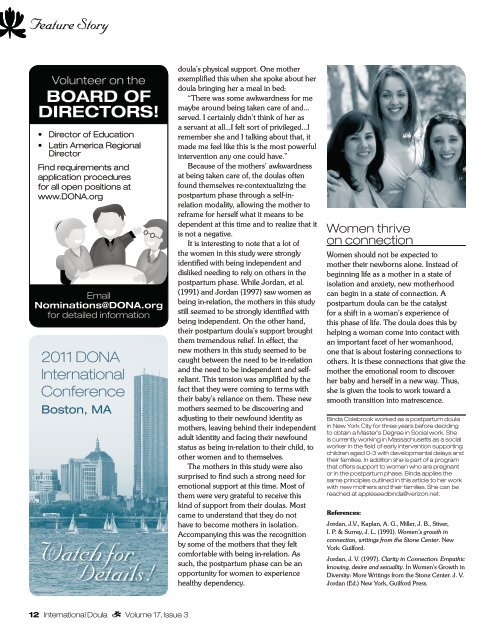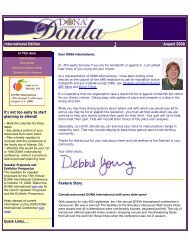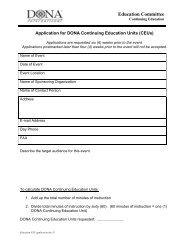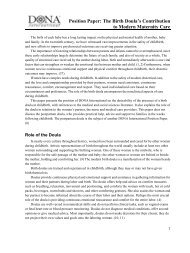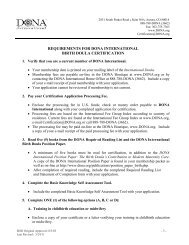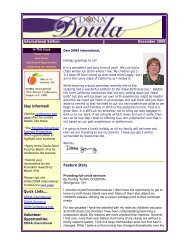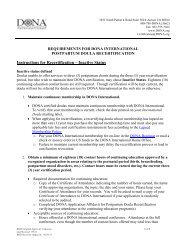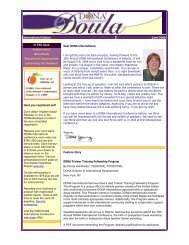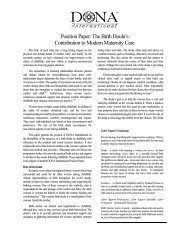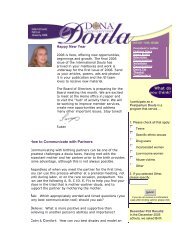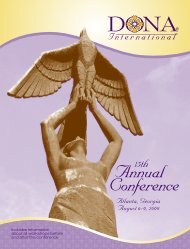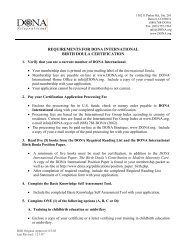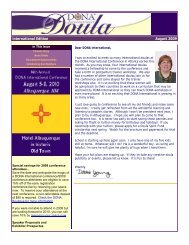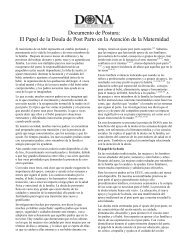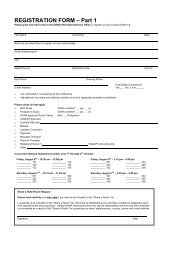The Power of Milk - DONA International
The Power of Milk - DONA International
The Power of Milk - DONA International
You also want an ePaper? Increase the reach of your titles
YUMPU automatically turns print PDFs into web optimized ePapers that Google loves.
Feature StoryVolunteer on theBoard <strong>of</strong>Directors!• Director <strong>of</strong> Education• Latin America RegionalDirectorFind requirements andapplication proceduresfor all open positions atwww.<strong>DONA</strong>.orgEmailNominations@<strong>DONA</strong>.orgfor detailed information2011 <strong>DONA</strong><strong>International</strong>ConferenceBoston, MAWatch forDetails!doula’s physical support. One motherexemplified this when she spoke about herdoula bringing her a meal in bed:“<strong>The</strong>re was some awkwardness for memaybe around being taken care <strong>of</strong> and…served. I certainly didn’t think <strong>of</strong> her asa servant at all…I felt sort <strong>of</strong> privileged…Iremember she and I talking about that, itmade me feel like this is the most powerfulintervention any one could have.”Because <strong>of</strong> the mothers’ awkwardnessat being taken care <strong>of</strong>, the doulas <strong>of</strong>tenfound themselves re-contextualizing thepostpartum phase through a self-inrelationmodality, allowing the mother toreframe for herself what it means to bedependent at this time and to realize that itis not a negative.It is interesting to note that a lot <strong>of</strong>the women in this study were stronglyidentified with being independent anddisliked needing to rely on others in thepostpartum phase. While Jordan, et al.(1991) and Jordan (1997) saw women asbeing in-relation, the mothers in this studystill seemed to be strongly identified withbeing independent. On the other hand,their postpartum doula’s support broughtthem tremendous relief. In effect, thenew mothers in this study seemed to becaught between the need to be in-relationand the need to be independent and selfreliant.This tension was amplified by thefact that they were coming to terms withtheir baby’s reliance on them. <strong>The</strong>se newmothers seemed to be discovering andadjusting to their newfound identity asmothers, leaving behind their independentadult identity and facing their newfoundstatus as being in-relation to their child, toother women and to themselves.<strong>The</strong> mothers in this study were alsosurprised to find such a strong need foremotional support at this time. Most <strong>of</strong>them were very grateful to receive thiskind <strong>of</strong> support from their doulas. Mostcame to understand that they do nothave to become mothers in isolation.Accompanying this was the recognitionby some <strong>of</strong> the mothers that they feltcomfortable with being in-relation. Assuch, the postpartum phase can be anopportunity for women to experiencehealthy dependency.Women thriveon connectionWomen should not be expected tomother their newborns alone. Instead <strong>of</strong>beginning life as a mother in a state <strong>of</strong>isolation and anxiety, new motherhoodcan begin in a state <strong>of</strong> connection. Apostpartum doula can be the catalystfor a shift in a woman’s experience <strong>of</strong>this phase <strong>of</strong> life. <strong>The</strong> doula does this byhelping a woman come into contact withan important facet <strong>of</strong> her womanhood,one that is about fostering connections toothers. It is these connections that give themother the emotional room to discoverher baby and herself in a new way. Thus,she is given the tools to work toward asmooth transition into matrescence.Binda Colebrook worked as a postpartum doulain New York City for three years before decidingto obtain a Master’s Degree in Social work. Sheis currently working in Massachusetts as a socialworker in the field <strong>of</strong> early intervention supportingchildren aged 0-3 with developmental delays andtheir families. In addition she is part <strong>of</strong> a programthat <strong>of</strong>fers support to women who are pregnantor in the postpartum phase. Binda applies thesame principles outlined in this article to her workwith new mothers and their families. She can bereached at appleseedbinda@verizon.net.References:Jordan, J.V., Kaplan, A. G., Miller, J. B., Stiver,I. P. & Surrey, J. L. (1991). Women’s growth inconnection, writings from the Stone Center. NewYork: Guilford.Jordan, J. V. (1997). Clarity in Connection: Empathicknowing, desire and sexuality. In Women’s Growth inDiversity: More Writings from the Stone Center. J. V.Jordan (Ed.) New York, Guilford Press.12 <strong>International</strong> Doula Volume 17, Issue 3


